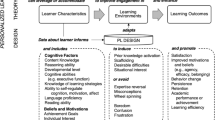Abstract
In this paper, we address issues of transparency, modularity, and privacy with the introduction of an open source, web-based data repository and analysis tool tailored to the Massive Open Online Course community. The tool integrates data request/authorization and distribution workflow features as well as provides a simple analytics module upload format to enable reuse and replication of analytics results among instructors and researchers. We survey the evolving landscape of competing established and emerging data models, all of which are accommodated in the platform. Data model descriptions are provided to analytics authors who choose, much like with smartphone app stores, to write for any number of data models depending on their needs and the proliferation of the particular data model. Two case study examples of analytics and responsive visualizations based on different data models are described in the paper. The result is a simple but effective approach to learning analytics immediately applicable to X consortium MOOCs and beyond.














Similar content being viewed by others
Notes
The Asilomar Convention for Learning Research in Higher Education (http://asilomar-highered.info/asilomar-convention-20140612.pdf).
edX Research Guide. Data Delivered in Data Packages. http://edx.readthedocs.org/projects/devdata/en/latest/internal_data_formats/package.html, 2014.
Jim Waldo. HarvardX Tools. http://github.com/jimwaldo/HarvardX-Tools.
Stanford Vice Provost Office for Online Learning. How to Access the VPOL Online Learning Data. http://datastage.stanford.edu.
Andreas Paepcke. json_to_relation. http://github.com/paepcke/json_to_relation.
Advanced Distributed Learning Initiative (ADL), U.S. Department of Defense. http://adlnet.gov/adl-research/performance-tracking-analysis/experience-api/xapi-background-history/.
IMS Global Learning Consortium (IMS). “Learning Measurement for Analytics Whitepaper (2013). http://www.imsglobal.org/sites/default/files/caliper/IMSLearningAnalyticsWP.pdf.
Andy Whitaker, “An Introduction to the Tin Can API”, The Training Business (19 July 2012). http://www.thetrainingbusiness.com/softwaretools/tin-can-api/.
xAPI Badges CoP. http://github.com/ht2/BadgesCoP/blob/master/earning/vocab.md.
xAPI Course CoP. http://github.com/adlnet/xAPI-SCORM-Profile/blob/master/xapi-scorm-profile.md; xAPI Social CoP. http://docs.google.com/document/d/1RpFxEh0KdO6WGgK74LUctP5oM35nsWHk0Czk__syH1Q/edit; xAPI Video CoP. http://docs.google.com/spreadsheets/d/1jq2zrvv2LKsE6-vbSBCc6H-PCyn40dQA4P96bl3s6BI/edit-gid=0.
ADL. http://w3id.org/xapi/adl/; WordNet, Princeton University. http://wordnet-rdf.princeton.edu/.
A number of these issues are expected to be resolved in the upcoming Caliper 1.1 release.
xAPI Vocabulary & Semantic Interoperability Group. http://www.w3.org/community/xapivocabulary/. See also http://github.com/adlnet/xapi-vocabulary.
Unizin, the Apereo Foundation and the UK’s JISC have all outlined plans to build standards-based learning analytics infrastructures in partnership with commercial vendors. See http://unizin.org/, http://www.apereo.org/communities/learning-analytics-initiative, http://analytics.jiscinvolve.org/wp/2015/06/15/jiscs-learning-analytics-architecture-whos-involved-what-are-the-products-and-when-will-it-be-available/.
References
Anderson, J. R., Corbett, A. T., Koedinger, K. R., & Pelletier, R. (1995). Cognitive tutors: Lessons learned. The Journal of the Learning Sciences, 4(2), 167–207.
Berland, M., Baker, R. S., & Blikstein, P. (2014). Educational data mining and learning analytics: Applications to constructionist research. Technology, Knowledge and Learning, 19(1–2), 205–220.
Bloom, B. S. (1968). Learning for mastery. Instruction and curriculum. Regional education laboratory for the Carolinas and Virginia, topical papers and reprints, Number 1. Evaluation Comment, 1(2), 1–12.
Breslow, L., Pritchard, D. E., DeBoer, J., Stump, G. S., Ho, A. D., & Seaton, D. T. (2013). Studying learning in the worldwide classroom: Research into edX’s first MOOC. Research & Practice in Assessment, 8, 13–25.
Corbett, A. T., & Anderson, J. R. (2001). Locus of feedback control in computer-based tutoring: Impact on learning rate, achievement and attitudes. In Proceedings of the SIGCHI conference on human factors in computing systems (pp. 245–252), ACM.
Daries, J. P., Reich, J., Waldo, J., Young, E. M., Whittinghill, J., Ho, A. D., & Chuang, I. (2014). Privacy, anonymity, and big data in the social sciences. Communications of the ACM, 57(9), 56–63.
Ferguson, R., & Shum, S. B. (2012). Social learning analytics: Five approaches. In Proceedings of the 2nd international conference on learning analytics and knowledge (pp. 23–33), ACM.
Heffernan, N. T., & Heffernan, C. L. (2014). The ASSISTments Ecosystem: Building a platform that brings scientists and teachers together for minimally invasive research on human learning and teaching. International Journal of Artificial Intelligence in Education, 24(4), 470–497.
Ifenthaler, D., & Widanapathirana, C. (2014). Development and validation of a learning analytics framework: Two case studies using support vector machines. Technology, Knowledge and Learning, 19(1–2), 221–240.
Koedinger, K. R., Baker, R. S., Cunningham, K., Skogsholm, A., Leber, B., & Stamper, J. (2010). A data repository for the EDM community: The PSLC DataShop. Handbook of Educational Data Mining, 43–56.
Koedinger, K. R., D’Mello, S., McLaughlin, E. A., Pardos, Z. A., & Rosé, C. P. (2015). Data mining and education. WIREs Cognitive Science, 6, 333–353. doi:10.1002/wcs.1350.
Lebo, T., Sahoo, S., McGuinness, D., Belhajjame, K., Cheney, J., Corsar, D., & et al. (2013). Prov-o: The prov ontology. W3C Recommendation, 30.
Lovett, M., Meyer, O., & Thille, C. (2008). The Open Learning Initiative: Measuring the effectiveness of the OLI statistics course in accelerating student learning. Journal of Interactive Media in Education, no. 14, JIME Special Issue: Researching Open Content in Education. http://jime.open.ac.uk/2008/14.
Miles, A., & Bechhofer, S. (2009). SKOS simple knowledge organization system reference. W3C recommendation, 18, W3C. http://www.w3.org/TR/2009/REC-skos-reference-20090818.
Pardos, Z. A., & Kao, K. (2015). moocRP: An open-source analytics platform. In Proceedings of the Second (2015) ACM conference on learning@ scale (pp. 103–110), ACM.
Siemens, G., Gasevic, D., Haythornthwaite, C., Dawson, S., Buckingham Shum, S., & Ferguson, R. (2011). Open learning analytics: An integrated and modularized platform (Concept Paper). SOLAR.
Veeramachaneni, K., Halawa, S., Dernoncourt, F., O’Reilly, U. M., Taylor, C., & Do, C. (2014). MOOCdb: Developing standards and systems to support mooc data science. arXiv preprint arXiv:1406.2015.
Verbert, K., Govaerts, S., Duval, E., Santos, J. L., Van Assche, F., Parra, G., & Klerkx, J. (2014). Learning dashboards: An overview and future research opportunities. Personal and Ubiquitous Computing, 18(6), 1499–1514.
Xu, Z., Goldwasser, D., Bederson, B. B., & Lin, J. (2014). Visual analytics of MOOCs at maryland. In Proceedings of the first ACM conference on learning@ scale conference (pp. 195–196).
Author information
Authors and Affiliations
Corresponding author
Rights and permissions
About this article
Cite this article
Pardos, Z.A., Whyte, A. & Kao, K. moocRP: Enabling Open Learning Analytics with an Open Source Platform for Data Distribution, Analysis, and Visualization. Tech Know Learn 21, 75–98 (2016). https://doi.org/10.1007/s10758-015-9268-2
Published:
Issue Date:
DOI: https://doi.org/10.1007/s10758-015-9268-2




